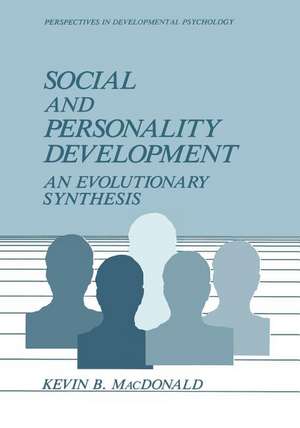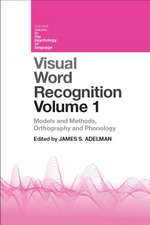Social and Personality Development: An Evolutionary Synthesis: Perspectives in Developmental Psychology
Autor Kevin B. MacDonalden Limba Engleză Paperback – 20 mai 2012
Preț: 648.24 lei
Preț vechi: 762.64 lei
-15% Nou
Puncte Express: 972
Preț estimativ în valută:
124.04€ • 129.25$ • 102.71£
124.04€ • 129.25$ • 102.71£
Carte tipărită la comandă
Livrare economică 03-17 aprilie
Preluare comenzi: 021 569.72.76
Specificații
ISBN-13: 9781475702941
ISBN-10: 1475702949
Pagini: 368
Ilustrații: 340 p.
Dimensiuni: 178 x 254 x 19 mm
Greutate: 0.64 kg
Ediția:1988
Editura: Springer Us
Colecția Springer
Seria Perspectives in Developmental Psychology
Locul publicării:New York, NY, United States
ISBN-10: 1475702949
Pagini: 368
Ilustrații: 340 p.
Dimensiuni: 178 x 254 x 19 mm
Greutate: 0.64 kg
Ediția:1988
Editura: Springer Us
Colecția Springer
Seria Perspectives in Developmental Psychology
Locul publicării:New York, NY, United States
Public țintă
ResearchCuprins
1. Theoretical Considerations.- I. Introduction.- II. Philosophical Issues and World Views.- III. General Theoretical Issues.- IV. Evolutionary Theory and the Theoretical Traditions of Social Development.- V. Theoretical Fragmentation or Integration?.- 2. Temperament and Personality Development.- I. Theories of Temperament.- II. Self-Regulation as Sensitivity to Rewards, with an Emphasis on the Positive Social Reward System: Evidence for a Third Personality Dimension.- III. Biological and Environmental Influences on Temperament.- IV. The Stability of Temperament.- V. Appendix.- 3. The Development of the Emotions.- I. Theories of Emotional Development.- II. Parent—Child Interaction as an Example of Emotional Processes in Development.- III. The Development of the Emotions.- 4. Social and Biological Events in Infancy and Their Relevance for Later Behavior.- I. Attachment in Evolutionary Perspective.- II. Aberrations in Attachment and Later Behavior.- 5. Parent—Child Relationships and the Transmission of Culture.- I. Global Parenting Styles.- II. The Family and the Socialization of Children in Evolutionary and Historical Perspective.- III. Centrifugal Tendencies within Families and Their Effects on Children.- IV. Affective Relationships within the Family and the Transmission of Culture.- V. General Effects of Decrements in Parental Investment and an Evolutionary Analysis of Parental Control.- VI. Appendix.- 6. Topics in the Development of Aggression, Peer Relations, and Sex Differences.- I. Issues in the Development of Aggression.- II. Issues in the Development of Peer Relations.- III. Sex Differences in Development.- 7. Moral and Altruistic Development I: The Roles of Cognition and Context.- I. The Cognitive-Developmental Approach to Moral Reasoning.- II. Rest’sComponent Model of Moral behavior.- III. A Review of the Literature on Moral Reasoning from the Perspective of Sociobiological Theory.- IV. Research on Norms Related to Altruism and Morality.- V. Reasoning about Altruistic Events.- VI. Summary and Conclusion.- 8. Moral and Altruistic Development II: The Importance of Socialization and Affect.- I. Descriptive Studies of Emotions and Their Role in Motivating Altruism.- II. Three Sociobiological Hypotheses.- III. Conclusion.- 9. Development in a Wider Context: Evolutionary Considerations.- I. Evolution and Ideology.- II. Socialization beyond the Family and Peer Systems.- III. Resource Availability as a Contextual Variable: Empirical Data.- IV. Conclusion and Integration.- References.


























